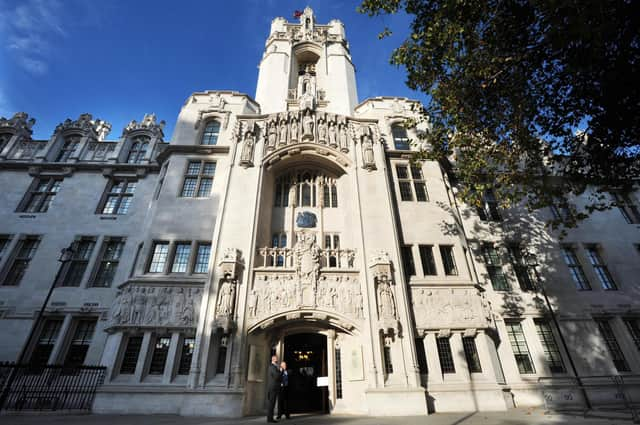Ben Lowry: A unionist government has argued that the Acts of Union has been set aside when it comes to trade with Northern Ireland


While in fact there were two legal challenges, one brought by the loyalist Clifford Peeples, the bulk of the arguments were made by a barrister representing key unionist politicians, the former attorney general of Northern Ireland, John Larkin KC.
The driving force in the case is the ex Brexit Party MEP Ben Habib, who was supported by a cross section of unionism’s most prominent figures – Jim Allister, Baronesses Hoey and Foster, Steve Aiken, and the late Lord Trimble.
The court is not expected to find against the government.
Advertisement
Hide AdAdvertisement
Hide AdThe challenge was heard over two days in front of five justices, including its most senior judges, Lords Reed and Hodge.
The appellants felt that both those men asked questions which showed a respectful interest in the arguments that the protocol is unconstitutional.
But the court, while not as overtly political as its American counterpart has long been, is nonetheless seen as being motivated at times by factors other than legal purism.
In autumn 2019 it ruled that Boris Johnson’s decision to prorogue (suspend) Parliament for five weeks was unlawful. The then prime minister had said it would give him time to produce a plan to get out of prevailing Brexit stalemate.
Advertisement
Hide AdAdvertisement
Hide AdThe UK’s top court issued its ruling by a unanimous 11-0 verdict. But the court just below it, the Court of Appeal of England and Wales, had found the very opposite, by three judges to none, that Mr Johnson’s action had been lawful.
And a judge who had recently quit the Supreme Court, Lord Sumption, also thought the government had acted lawfully.
Yet not one Supreme Court judge reached that verdict, prompting speculation that it had acted in such a unison way to show solidarity against the government’s action.
Judges also seem political in the pragmatic sense of avoiding major scraps with the political class, knowing that parliaments pass laws, judges only adjudicate on them.
Advertisement
Hide AdAdvertisement
Hide AdIf the five justices were to rule that the NI Protocol is unlawful it would throw the government into fresh chaos and make the widely expected UK-EU deal based on (probably minor) modifications to the Irish Sea border almost impossible.
But if, as expected, they rule the protocol constitutional then the implications will be equally huge. Article Six of Acts of Union of 1800 will be effectively dead. It reads:
“… his Majesty’s subjects of Great Britain and Ireland shall … be entitled to the same privileges and be on the same footing ... in respect of trade and navigation in all ports and places in the United Kingdom and its dependencies ...”
Not only that, it prohibited exactly the sort of future change that has come to pass via the protocol:
Advertisement
Hide AdAdvertisement
Hide Ad“… in all treaties made by his Majesty his heirs and successors, with any foreign power, his Majesty’s subjects of Ireland shall have the same privileges and be on the same footing as his Majesty’s subjects of Great Britain.”
Article Six of the Acts of Union has already been found subordinate to the protocol by Mr Justice Colton in the Northern Ireland high court, upheld by the NI Appeal Court under Mrs Justice Keegan. That constitutional shift will be given a whole new layer of authority by the Supreme Court if it so rules.
The UK government, according to its KC Tony McGleenan who was before the London court this week, says that Article 6 has only been disapplied as opposed to “impliedly repealed” (as Mr Justice Colton put it), which makes it sound less permanent.
But then the government has intermittently played down the protocol. A key plank of the unionist legal case is that you cannot make such constitutional change by implication. They say that a foundational legal document such as the Acts of Union should only be changed by explicit wording that states clearly what it is doing.
Advertisement
Hide AdAdvertisement
Hide AdThis ‘Conservative and Unionist’ government has been made to look foolish in its approach to the Irish Sea border. At first, Boris Johnson and his secretary of state Brandon Lewis argued it did not exist. Then, in the summer of last year, they began to argue that it was an affront to Northern Ireland’s status as a constituent part of the UK.
When, later that year, I asked the former Brexit minister Lord Frost, why they were resisting the unionist legal challenge when they seemed to agree with unionist criticism of it, he said it was an “interesting question”.
For a while government opposition to the case stalled. Now it is back in court, making what you would think is an embarrassing argument for a ‘unionist’ UK government to make.
A final thought.
When you read early News Letters from 1738/1739, we on this island (‘this kingdom’ as Ireland was called) were joined with the the kingdom on the other island, Great Britain, yet we were apart – we did not have the same Westminster representation. The Acts of Union 1800 revolutionised that.
Advertisement
Hide AdAdvertisement
Hide AdWhen you look at that act from 2022 it seems ancient. But if you read your way up to it, as I have done by reading News Letters chronologically from the 1730s, you see how modern it was (as was the early American legal framework).
It is extraordinary that Article Six, which not only enshrined internal trade but sought to do so in perpetuity, can be set aside so easily.
Outside of unionist circles, this week’s case went barely noticed.
You certainly can’t change the US constitution with ease. It is so hard to amend that it happens only every few decades, and always on matters of less substance than the fettering of internal US trade.
• Ben Lowry (@Benlowry2) is News Letter editor